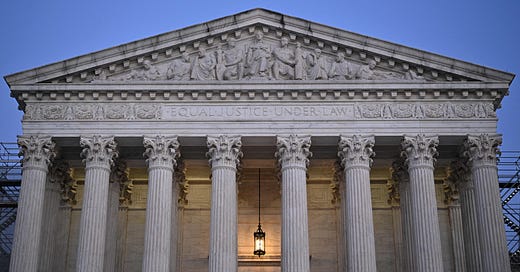Supreme Court Releases Code of Conduct, Insists Everything’s Copacetic
Will likely prevent Congress from attempting serious ethics reform for the Court.

THE U.S. SUPREME COURT released a document this week, a “Code of Conduct” for justices, signed onto by all the current members of the Court and accompanied by a brief prefatory statement and five pages of commentary. You don’t have to be a close observer of the Court to recognize that this unprecedented action comes in response to news coverage of—and widespread public outrage over—certain justices secretly accepting lavish gifts from billionaires, including some with business before the Court, and engaging in other troubling behaviors.
Senator Richard Durbin (D-Ill.), the chairman of the Senate Judiciary Committee, and some legal experts have cautiously applauded the move as a step toward accountability for an inherently undemocratic1 American institution—nine unelected individuals who serve for life, with no superior body to review their split decisions.
Before we dig into the details of the code of conduct, let’s revisit some of the reasons why Supreme Court ethics reform has become such a hot-button issue of late:
Justice Clarence Thomas accepted luxury travel on private jets from GOP megadonor Harlan Crow—including to Crow’s extravagant lodge in the Adirondacks—and other rich folks without disclosing the gifts in Thomas’s annual disclosure reports.
Crow purchased Thomas’s childhood home and some empty lots nearby in Savannah, Georgia, in 2014, reportedly netting the justice, his mother, and his since-deceased brother over $133,000. Crow then made tens of thousands of dollars’ worth of improvements to the home, where Thomas’s 94-year-old mother still lives. Thomas didn’t report the transaction (real estate deals over $1,000 qualify for disclosure).
In 2008 Justice Samuel Alito flew to Alaska for a fishing trip on a private jet belonging to a billionaire hedge fund manager, Paul Singer, who has had matters before the Supreme Court. Alito didn’t disclose it or recuse himself from Singer’s cases, later doubling down that he didn’t have to.
Thomas’s wife, Ginny Thomas, texted then-White House Chief of Staff Mark Meadows, who is currently indicted in Georgia for his role in the attempt to subvert the 2020 election, about thwarting Joe Biden’s win in the lead-up to the January 6, 2021 insurrection. Thomas didn’t recuse himself from a number of related cases then pending period before the Supreme Court, and he was even the lone dissenter to an opinion holding that Trump had to turn over documents to congressional investigators.
The Court has never had a written code of ethics across its 234-year history, instead relying on “common law rules” and internal norms to keep the justices honest. Still, there’s hardly cause to be sanguine with the latest development, which could have the opposite effect than its ostensible purpose, reading as it does like an insurance policy against actual legislative reform.
The primary problem, as others have noted, is that it contains no enforcement mechanism—no means of filing a complaint if there’s a violation or otherwise bringing an issue before a neutral third party for investigation and assessment—which means that the justices lack any meaningful incentive to stop doing what some have been doing, to their own (sometimes immense) personal and financial benefit. Lower federal courts, by contrast, are subject to the Judicial Conduct and Disability Act, which allows the public to file complaints alleging ethical violations—which can trigger penalties that include barring a judge from being assigned new cases, public reprimands by the judicial council of a particular federal circuit court (these bodies were created by statute in 1939), and even referral to the Judicial Conference of the United States for possible consideration of impeachment proceedings. If a party files a motion seeking to force a judge to recuse themselves from a case in which they have an apparent interest, and the judge refuses to step aside, that decision can be appealed to a higher court.
Not so with the justices of the Supreme Court.
None of which is to say that an enforcement mechanism would be an easy thing to put in place; indeed, it is an arguably tricky constitutional matter. But it’s worth having in mind that the lack of such a higher authority means this document is fundamentally rather different from what the public might expect of something called a “code of conduct.”
Worse, the release of this document means that nothing more will likely happen to address the serious problem of bias and conflict of interest that plagues the Court. When the next such controversy arises, Chief Justice Roberts can simply point to this document with a shrug, and underscore its language on voluntary compliance. The new statement doesn’t even require that the justices explain themselves publicly when something seems seriously amiss. What’s really needed is for Congress to act to pass legislation, which this document now makes even less politically feasible.
Even worse worse, the document seems to tacitly declare that what the justices have been publicly criticized for to date is okay. In the prefatory statement accompanying the code of conduct, the Court writes: “The absence of a Code . . . has led in recent years to the misunderstanding that the Justices of this Court, unlike all other jurists in this country, regard themselves as unrestricted by any ethics rules.” All of the stuff that people are worried about is thus a mere misunderstanding. It begrudgingly adds: “To dispel this misunderstanding, we are issuing this Code, which largely represents a codification of principles that we have long regarded as governing our conduct.” Particularly galling is the assertion that “for the most part these rules and principles are not new.” The language implies that everything is somehow actually humming along as it should be—all this does is put pen to paper to memorialize the status quo.
THE CODE OF CONDUCT places no specific restrictions on the justices’ acceptance of any travel or gifts. Instead, it states that “expense reimbursement should be limited to the actual or reasonably estimated costs of travel, food, and lodging reasonably incurred by the Justice and, where appropriate to the occasion, by the Justice’s spouse or relative”—but then claims that “for some time, all Justices have agreed to comply with the statute governing financial disclosure, and the undersigned Members of the Court each individually reaffirm that commitment” (emphasis added). So what Thomas and Alito did is supposedly in keeping with this document (obviously absurd).
Apparently, the justices also anticipate that, even if there is a possible problem of bias in connection with a particular case, disqualification will be rare, and must yield to the practical necessity of having all nine justices weigh in on cases, on the rationale that there’s nobody else in America who could fill their shoes in their absence. “Neither the filing of a brief amicus curiae” by a party with a close connection to a justice “nor the participation of counsel for amicus curiae requires a Justice’s disqualification,” they state.
Instead: “A Justice should disqualify himself or herself in a proceeding in which the Justice’s impartiality might reasonably be questioned, that is, where an unbiased and reasonable person who is aware of all relevant circumstances would doubt that the Justice could fairly discharge his or her duties,” including knowledge of:
personal bias or prejudice;
that the Justice or his family has a financial interest in the subject matter of a case; or
that the Justice or his spouse has “an interest that could be substantially affected by the outcome of the proceeding.”
Each justice gets to decide for himself or herself, privately, whether these conditions are met.
The document also defines “financial interest” as “a legal or equitable interest, however small,” but notes numerous exceptions, including that “an office in an educational, religious, charitable, fraternal, or civic organization is not a ‘financial interest’ in securities held by the organization.” Justices can even attend a “fundraising event” but should not “knowingly” be a speaker.
Justice Elena Kagan said there were some disagreements in the justices’ development of the code, but declined to elaborate. Meanwhile, recent Gallup polls show that public trust in the Supreme Court was at near record lows at the start of its term on October 2, with only 40 percent of respondents approving. The Court’s latest maneuver only confirms that, at least for some of them, the justices don’t much care.
The Court has always, by design, been a largely undemocratic institution—but the current Court is arguably even more undemocratic than usual: Three of the justices were put on the Court by Donald Trump, a president who lost the popular vote, and they were then confirmed with virtually zero support from the Senate Democrats who represent a majority of the nation’s population: 45 out of the Senate’s 48 Democrats voted against Gorsuch; 48 out of 49 Senate Democrats voted against Kavanaugh; and all 48 Senate Democrats voted against Barrett.





